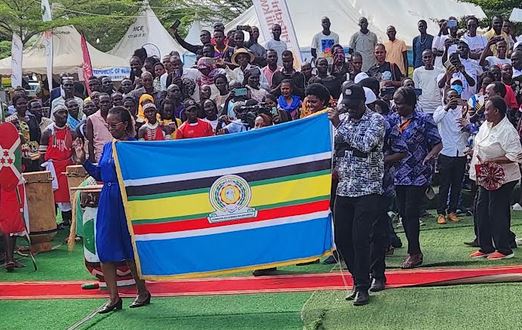The East African Community (EAC) 24th micro, small, and medium enterprises trade fair that was hosted by South Sudan for the first time in Juba concluded on Tuesday.
The trade fair brought together about 1,700 exhibitors from the EAC countries who showcased products including textiles, crafts, foods and beverages, and machinery made in the region, among others.
Speaking during the closing ceremony at the Freedom Hall in Juba, Ambassador Joseph Moum Majak, South Sudan`s Minister of Trade and Industry, said throughout the 9 days, they witnessed the power of creativity, innovation, and entrepreneurship brought to light by the exhibitors who came from across the EAC.
“It has brought about such interaction that we can bridge gaps, share knowledge, and open new markets together. We have laid another stone on the foundation for sustainable development, economic resilience, and shared prosperity in our region,” he said. “As we close this year’s trade fair, let us carry forward the energy and collaboration here in Juba, and let us continue to support our micro, small, and medium enterprises as they expand their capabilities, innovations, and skills across borders.”
Minister Moum added: “Let us remain committed to the growth, and empowerment of our micro-small and medium enterprises and to building an East Africa driven by innovation, entrepreneurship, and unity.”
For her part, Flavia Busingye, Director of Customs and Trade in the East African Community, commended the exhibitors for their creativity and spirit of entrepreneurship that has made the fair a vibrant showcase of the potential that East Africa has.
“For the past ten days we have recognized the diversity of East African talents with over 1500 exhibitors across the areas of textiles, leather industry production, arts, crafts, and agribusiness and the quality of products or display reflected the evolution of our SMEs. It is clear that our businesses are adopting advanced production processes and enhancing product quality indicating a promising future in the sector,” she said. “While we celebrate this achievement we recognize the areas for growth and many SMEs we know remain informal and they face quite several challenges adopting modern technology like e-commerce and accessing financial services. We must encourage SMEs to formalize their operations, streamline organization structures and operations, and embrace digital tools to expand their market reach.”
“This will ensure that SMEs across East Africa are prepared to thrive in an increasingly competitive market,” Busingye added.
Commenting on the exhibition, Mwa Peter Okot, from Gulu University in Uganda who exhibited among others biogas stoves, said they have been able to supply 500 of their products in northern Uganda and seek to tap the market in South Sudan.
“The biogas stove works perfectly with low consumption and it cooks food fast, especially beans that are very hard to cook.” He said. “We have been able to supply over 500 in the communities in northern Uganda so we believe if we can get this product rolled out across East Africa, we shall be able to address some of these energy access problems.”
“Then we shall also be able to address climate change issues because we are no longer going to cut trees but use waste from animals,” Okot added.
He noted that he has been able to network with potential clients in the NGO sector, UN, women’s groups, and individuals who are willing to adopt his technology.
Meanwhile, Rachael Julius from Tanzania who exhibited textiles, said she had a very good experience in Juba and has been able to network and get more clients in South Sudan.
“My experience in Juba was good and the market was good but the problem was people were not told about this exhibition, a lot of people just found it on the very last days that is when they realized there was this big exhibition,” she said. “What I will advise our leaders is that they should announce at least one month before we start the exhibition so that entrepreneurs will be able to sell and also people in Juba will get an opportunity to get products from different countries of East Africa.”
On her part, Alice Njoki Mwaura from Kenya who exhibited crafted and crochet bags among others, said the exhibition started slow but with time they were able to get clients.
“It has been quite an experience, at first the weather was very hot but we were able to adjust and manage. The business also started at a low rate but we are thankful that people responded well,” she stated. “Juba has been good to us and I know the next time we are here, people will know us well, they will know that we are here and they will come and buy our products.”




